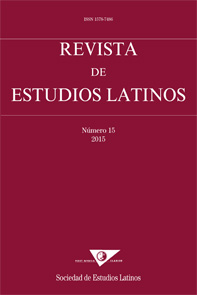Really happy life to aeternal afterlife: Martial 10, 47 and the orationes of Ausonius and Paulinus
DOI:
https://doi.org/10.23808/rel.v15i0.87695Keywords:
Classical tradition; Ausonius Eph.3 and Epic.; Paulinus of Pella, Oratio; textual transmission; authorshipAbstract
The uota displayed in Mart. 10, 47 inspire Ausonius’ Epicedion in patrem and some verses of his Precatio matutina (Eph. 3), as well as an Oratio scti. Paulini which two manuscripts of Ausonius transmitted and Courcelle finally assigned to Paulinus of Pella. Nevertheless, the close affinities these two prayers share and the way they use Mart. 10, 47 as a model might be proof of Ausonius’ authorship, who would have written both in his eighties, after retirement from court.
Downloads
References
Adamik, T. (1975): «Martial and the vita beatior», AUB(class) 111, 55-64.
Alvar Ezquerra, A. (1990): Décimo Magno Ausonio. Obras. Traducción, introducción y notas, 2 vols., Madrid, Biblioteca Clásica Gredos, 146 y 147.
Bowersock, G. W. (1986): “Symmachus and Ausonius” en Bowersock, G. W.-Paschoud, F. et al. (eds.), Colloque genevois sur Symmaque à l’occasion du mille six centième anniversaire du conflit de l’autel de la Victoire: douze exposés, suivis de discussions, París, Belles lettres, 1-15.
Coşkun, A. (2002): “Chronology in the Eucharisticos of Paulinus Pellaeus: a Reassessment», Mnemosyne 55, 329-44.
Courcelle, P. (1948): “Une prière de jeunesse de Paulin de Pella” en Histoire littéraire des grandes invasions germaniques, París, Hachette, 293-302 (reimp. 3 (=”Un nouveau poème de Paulin de Pella”, VChr 1, 1947, 101-113).
— (1968): Recherches sur les Confessions de saint Augustin. Nouvelle édition augmentée et illustrée. París, E. de Boccard (ed. or. 1950).
Damschen, G.-Heil, A. (2004): Marcus Valerius Martialis. Epigrammaton liber decimus. Das zehnte Epigrammbuch. Text, Übersetzung, Interpretationen. Mit einer Einleitung, Martial-Bibliographie und einem rezeptionsgeschichtlichen Anhang, Francfort del Meno, Peter Lang.
Della Corte, F., (1960): “L’ordinamento degli Opuscula di Ausonio”, RCCM 2/1, 21-9.
Doignon, M. J. (1981): “Quisque suos patitur manes (Virgile, Énéide, 6, 743) dans le christianisme latin a la fin du IVe siécle (Zénon de Vérone, Ausone, Ambroise)” en Chevalier, R. (ed.), L’épopée gréco-latine et ses prolongements européens, Caliope II, París, 107-116.
Francis, Ch. (2007): Martial. Epigrammata. Book X. A Commentary (tes.), Otago.
Friedländer, L. (1886): Epigrammaton libri. Mit erklärenden Anmerkungen, Leipzig.
Green, R. P. H. (1977): “Ausonius’ Use of the Classical Latin Poets: Some New Examples and Observations», CQ 27, 441-452.
— (1991): The Works of Ausonius. Edited with Introduction and Commentary, Oxford, OUP.
Hartel, W. von (1894): Sancti Pontii Meropii Paulini Nolani carmina, CSEL, vol. XXX, Viena.
Heilmann W. (1984): “Wenn ich frei sein könnte für ein wirkliches Leben ... Epikureische bei Martial”, A&A 30, 47-61.
Kay, N. M. (2001): Ausonius. Epigrams. Text with Introduction and Commentary, Londres-N. York, Bloomsbury.
Laguna Mariscal, G. (2000): “Cosas que procuran una vida feliz: contenido y fortuna literaria del epigrama X 47 de Marcial” en Homenaje a la profesora Carmen Pérez Romero, Cáceres, Universidad de Extremadura, 321-337.
Langlois, P. (1969): “Les poèmes chrétiens et le christianisme d’Ausone”, RPh 43, 39-58.
Lucarini, C. M. (2006): Paulinus Pellaeus, Carmina (Accedunt duo carmina ex cod. Vat. Vrb. 533), Múnich-Leipzig, De Gruyter.
Martin, J. (1971): “La prière d’Ausone: texte, essai de traduction, esquisse de commentaire”, BAGB 30, 369-382.
Moussy, C. (1974): Paulin de Pella. Poème d’action de grâces et prière. Introduction, texte critique, traduction, notes et index, París, Editions du cerf.
Pastorino, A. (1962): “A proposito della tradizione del testo di Ausonio”, Maia 14, 41-68 y 212-243.
— (1971): Opere di Decimo Magno Ausonio, Turín, UTET.
Prete, S. (1959): “Problems of the text of Ausonius”, AC 28,1, 243-254.
Seeck, O. (1887): “Ausonius, rec. Peiper”, GGA 149, 497-520.
Spisak, A. L. (2002): “The Pastoral Ideal in Martial, Book 10”, CW 95/ 2, 127-141.
Sullivan, J. P. (1986): “Some Versions of Martial 10.47; the Happy Life”, CO 63, 112-114.
Willams, C. (2006): “Identified Quotations and Literary Models: the Example of Martial 2,41” en Nauta, R. R.-Dam, H.-J. van-Smolenaars, J. J. L. (eds.), Flavian Poetry, Mnemosyne suppl. 270, Leiden, Brill, 329-348.
Downloads
Published
How to Cite
Issue
Section
License
Copyright (c) 2015 Revista de Estudios Latinos

This work is licensed under a Creative Commons Attribution-NonCommercial-NoDerivatives 4.0 International License.
The originals published in the printed and electronic editions of this journal are the property of the Revista de Estudios Latinos and can be circulated as long as the original source and authorship is made clear in any reproduction, full or partial, of the same, and as long as this is not done for commercial purposes.






